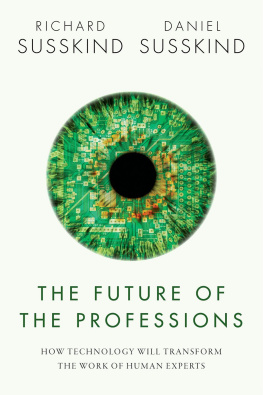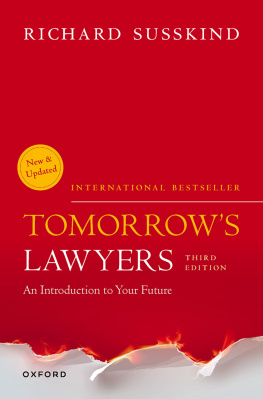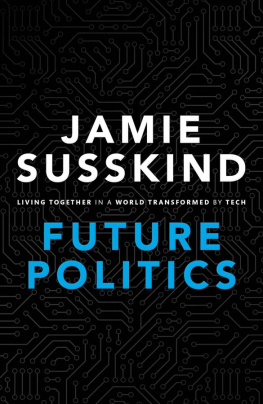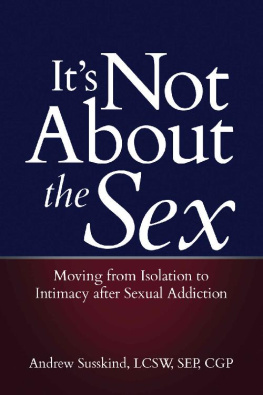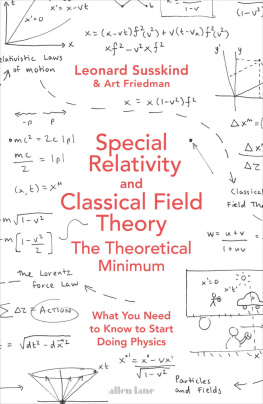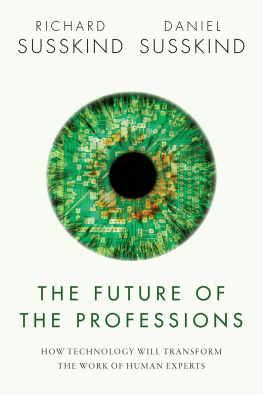Susskind Richard - The Future of the Professions
Here you can read online Susskind Richard - The Future of the Professions full text of the book (entire story) in english for free. Download pdf and epub, get meaning, cover and reviews about this ebook. year: 2015, publisher: OUP Oxford, genre: Romance novel. Description of the work, (preface) as well as reviews are available. Best literature library LitArk.com created for fans of good reading and offers a wide selection of genres:
Romance novel
Science fiction
Adventure
Detective
Science
History
Home and family
Prose
Art
Politics
Computer
Non-fiction
Religion
Business
Children
Humor
Choose a favorite category and find really read worthwhile books. Enjoy immersion in the world of imagination, feel the emotions of the characters or learn something new for yourself, make an fascinating discovery.
- Book:The Future of the Professions
- Author:
- Publisher:OUP Oxford
- Genre:
- Year:2015
- Rating:4 / 5
- Favourites:Add to favourites
- Your mark:
- 80
- 1
- 2
- 3
- 4
- 5
The Future of the Professions: summary, description and annotation
We offer to read an annotation, description, summary or preface (depends on what the author of the book "The Future of the Professions" wrote himself). If you haven't found the necessary information about the book — write in the comments, we will try to find it.
The Future of the Professions — read online for free the complete book (whole text) full work
Below is the text of the book, divided by pages. System saving the place of the last page read, allows you to conveniently read the book "The Future of the Professions" online for free, without having to search again every time where you left off. Put a bookmark, and you can go to the page where you finished reading at any time.
Font size:
Interval:
Bookmark:

A swashbuckling journey through the professions, this book makes sense of sweeping changes going on today and helps us see what it will mean to be a professional in an era of ubiquitous knowledge and increasingly capable machines. The authors rigorous skepticism reveals an astounding future.
Hugh Verrier, Chairman, White & Case
Many books about the future are shallow and unnecessarily alarmist. This book is neither. We are behaving like ostriches in the developed world, refusing to see that technology is on the cusp of fundamentally reshaping professions. The future is bright, but only if we start embracing, rather than shunning, the future which the Susskinds show is hurtling towards us.
Sir Anthony Seldon, Vice-Chancellor, University of Buckingham, and former Master of Wellington College
If you want to know how technology will continue to transform our lives, read this book! Well researched, beautifully written, comprehensive, insightful, and encouraging, the authors convincingly make the case that no profession is immune to these monumental changes, and that they provide an unprecedented opportunity for those who embrace rather than resist them.
Professor Nicholas F. LaRusso, MD, Founding Medical Director of the Mayo Clinic Center for Innovation
In the tax profession we have seen transformational change, striking at the very foundations of what we do and how we do it. In this compelling work, the Susskinds help us think more clearly about the crucial issues and opportunities we face and set clear insight as to the way in which we must respond. Essential reading for anyone interested in the future of a professional organization.
Conrad Young, Deloitte Global Leader, Tax Management Consulting
Professions beware! In this insightful and thought-provoking book, Richard and Daniel Susskind capture the essence of todays changing environment where, whilst the destination may not be certain, it is clear the status quo will not survive. Technology in particular is having a profound impact across the professions and no group seems exempt. The future has never been so ripe with challenges and opportunities.
Richard Sexton, Vice Chairman, Global Assurance, PwC

Great Clarendon Street, Oxford, ox 2 6 dp , United Kingdom
Oxford University Press is a department of the University of Oxford. It furthers the Universitys objective of excellence in research, scholarship, and education by publishing worldwide. Oxford is a registered trade mark of Oxford University Press in the UK and in certain other countries
Richard Susskind and Daniel Susskind 2015
The moral rights of the authors have been asserted
First Edition published in 2015
Impression: 1
All rights reserved. No part of this publication may be reproduced, stored in a retrieval system, or transmitted, in any form or by any means, without the prior permission in writing of Oxford University Press, or as expressly permitted by law, by licence or under terms agreed with the appropriate reprographics rights organization. Enquiries concerning reproduction outside the scope of the above should be sent to the Rights Department, Oxford University Press, at the address above
You must not circulate this work in any other form and you must impose this same condition on any acquirer
Published in the United States of America by Oxford University Press 198 Madison Avenue, New York, NY 10016, United States of America
British Library Cataloguing in Publication Data Data available
Library of Congress Control Number: 2015939043
ISBN 9780198713395
ebook ISBN 9780191022418
Printed in Italy by L.E.G.O. S.p.A.
Links to third party websites are provided by Oxford in good faith and for information only. Oxford disclaims any responsibility for the materials contained in any third party website referenced in this work.
We dedicate this book to the memory of
Shirley Susskind (19352015)
a very loving mother and grandmother
It is unusual for a father and son to write a book together. Before thanking the many people who helped us with this book, we thought readers would be interested to learn a little about the background to our collaboration.
For more than thirty years, I have been working on transforming the way that lawyers and courts work. I have written eight related books, and many of my theories about the future of legal services are no longer considered outrageous. Over the years, and around the world, at the end of my lectures to lawyers, I have been approached by stray doctors, auditors, architects, and many others who have said that my ideas apply equally to their own professions. I have had similar feedback in my consulting work with leading tax and audit specialists, and from my work as a university professor and school governor in the education sector. The starting-point for the research underpinning the book, therefore, is a well-tested and substantially corroborated set of ideas about the future of legal services that other professionals say resonates beyond law. One main purpose of the book is to test and extend this hypothesis about the law and lawyers to the professions more generally.
Above all, the project that led to this book has allowed me to work intensely with my son, Daniel. Very few fathers have this opportunity. It has been the high point of my working life.
Five years have passed since my Dad and I first sat down to talk about this book. He had spent most of his career thinking about the future of the legal profession. But, for a while, he had sensed that his thinking applied equally well elsewhere. At the time I was working in the Policy Unit in 10 Downing Street. As we talked, it became very clear that my experience in government confirmed his suspicions. And so we decided to set off on a project, together, to think about the future of the professions. It has been an extraordinarily happy five years, and a great privilege.
This book is written in the first person plural. This reflects the fact that our views are shared views, so that when we say that we believe, we see, or we predict, then our positions are indeed aligned. However, we accept that our use of we in the past tense is sometimes anomalous. For example, where we speak of what we wrote in the mid-1980s, one of us (Daniel) was not yet alive. Nonetheless, as a convention throughout the book, when we speak of we, we may be referring, variously, to our joint views or experience or those of either one of us.
We have been fortunate to have had the help of a large number of people while writing this book. The following list comprises the many individuals who gave generously of their time to be interviewed, alongside numerous friends, colleagues, and clients who supported us throughout. To each and every one of you we extend our warmest thanks: David Agus, David Barnes, George Beaton, Lukas Biewald, Nick Birks, Bruce Braude, Jonathan Brayne, Steven Brill, Tim Brown, Simon Carne, Mark Chandler, Stacey Childress, Keith Coleman, Richard Collier-Keywood, Charles Conn, Dan Cooperman, Jim Dabney, John Danner, Ian Davis, Robin Downie, Matthew Edwards, Neville Eisenberg, Philip Evans, Alice Fermor-Hesketh, Gi Fernando, Cam Findlay, Daniel Finkelstein, Joshua Foer, Howard Gardner, Josh Glancy, Tom Goetz, Ian Goldin, Colin Gounden, Muir Gray, Ashok Gupta, Ben Hammersley, Mark Harris, Mike Hess, Silvia Hodges, Jonathan Hughes, Will Hunter, Michael Ingram, Ari Kaplan, Hanif Kara, John Kerr, Daphne Koller, Daniel Kraft, Kieran Kumaria, Adrian Lajtha, Nick LaRusso, Bill Liao, Paul Lippe, Ian Lloyd, Jay Lorsch, George Lowder, Ian Lloyd, Bruce MacEwen, David Maister, James Manyika, Helen Margetts, Chris McKenna, Christopher Michel, Christopher Millard, Michael Mills, John Moore, David Morley, Tim Morris, Alastair Morrison, Gary Nelson, Howard Nichols, Cory Ondrejka, Chris Outram, Jonathan Oviatt, Alan Paterson, David Pester, Richard Punt, Stephen Rabinowitz, Chas Rampenthal, Paul Robinson, Joel Rose, Mari Sako, Viktor Mayer-Schnberger, Dov Seidman, Anthony Seldon, Richard Sennett, Richard Sexton, Tom Standage, Janet Stanton, Paloma Strelitz, Ziona Strelitz, Matt Sucherman, Stephen Swensen, Gideon Sylvester, Eric Topol, Darrel Untereker, David Vines, Vivek Wadhwa, Kent Walker, Ted Wang, Anthony Warrens, Rachel Whetstone, David Wilkins, Tom Wright, and Conrad Young.
Font size:
Interval:
Bookmark:
Similar books «The Future of the Professions»
Look at similar books to The Future of the Professions. We have selected literature similar in name and meaning in the hope of providing readers with more options to find new, interesting, not yet read works.
Discussion, reviews of the book The Future of the Professions and just readers' own opinions. Leave your comments, write what you think about the work, its meaning or the main characters. Specify what exactly you liked and what you didn't like, and why you think so.

